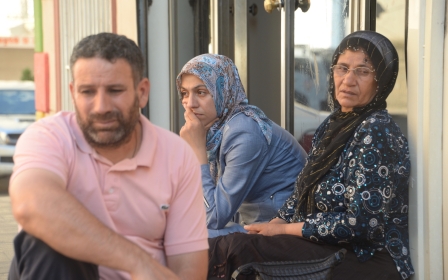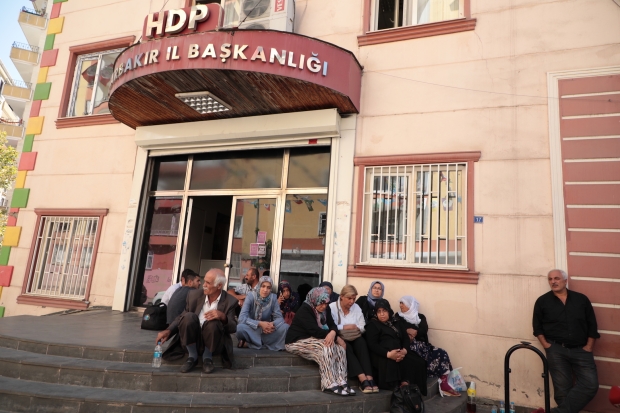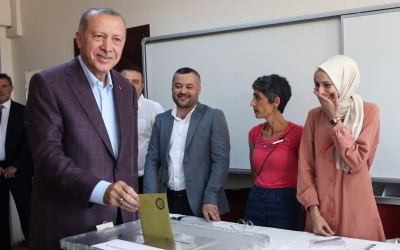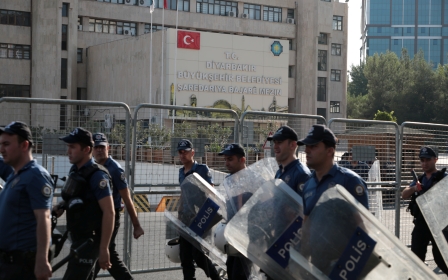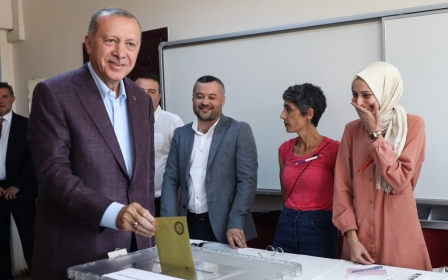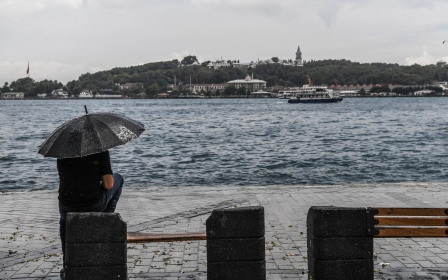In Diyarbakir, Kurdish families accuse PKK of deceptively recruiting their children
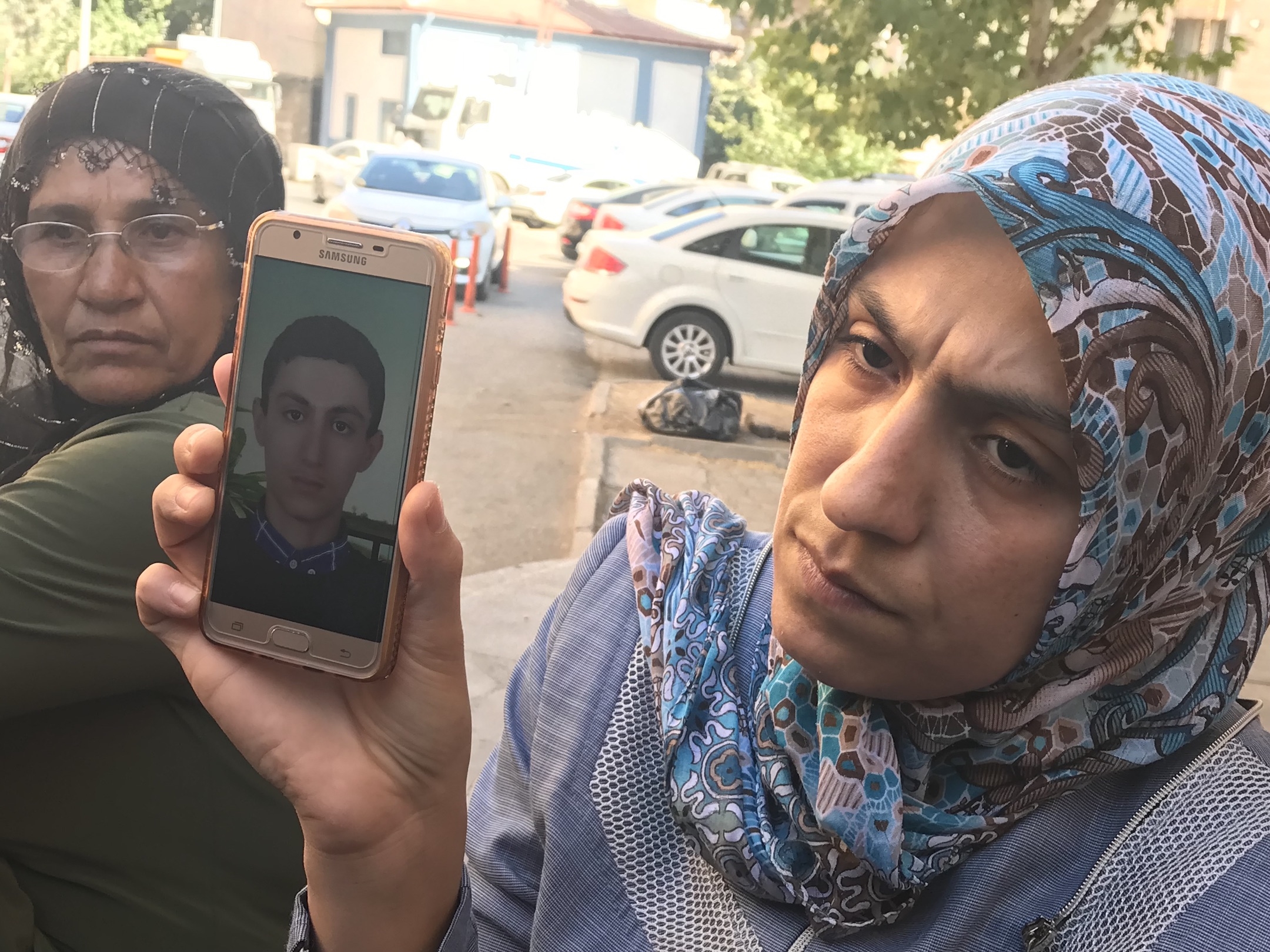
Ten months ago, Aysegul Bicer's 17-year-old son, Mustafa, crossed into Syria to join a Kurdish militia. She has not seen him since, and time is ticking.
"I have one life and I'm ready to give it up. I'm dying every day. My child will come back," Bicer, who has cancer, said through tears.
Bicer was among members of 11 Kurdish families who have staged a sit-in since Tuesday outside the pro-Kurdish People's Democracy Party's (HDP) local office in Diyarbakir.
Many come from the poorer parts of Kurdish society and blame the Kurdistan Workers' Party (PKK), whose militants are in a decades-long battle with the Turkish government, for recruiting or even kidnapping their children.
Bicer also blamed the HDP. Mustafa was last seen in the HDP's branch office in Diyarbakir.
New MEE newsletter: Jerusalem Dispatch
Sign up to get the latest insights and analysis on Israel-Palestine, alongside Turkey Unpacked and other MEE newsletters
"The party influences children on social media. They brainwash them. He phoned us and said he was in Syria's Kobani with new clothes and shoes. I begged him to return," she said.
"I couldn't convince him. He personally told me that he visited the HDP and they introduced him to others, and then he was taken to Syria. They have no shame. They send their own children to private schools, ride nice cars, live in beautiful houses. But poor families like us are viewed as potential combat reserves."
The sit-in was started last month by Hacire Akar, who claimed that her own 21-year-old son was deceived, held by HDP members and then taken to rural areas controlled by the PKK.
Akar said she wouldn't leave the sit-in until her son, Mehmet, came back. She made headlines in mainstream Turkish media, and even received a call from Turkish President Recep Tayyip Erdogan.
However, a few days later, Mehmet told a news agency close to the HDP that he hadn't been kidnapped and that he had run away from an unwanted marriage. Eventually, he returned to his mother.
Akar was confused: how did HDP members reach his son, who had left his phone at home, while she herself couldn't?
"He introduced his girlfriend to us and said that he wanted to be married as soon as possible," Akar told journalists last month.
Mehmet Akar was brainwashed by the PKK, the Diyarbakir police's counter-terror unit claimed to MEE.
Mehmet is not Akar's first child to have allegedly joined the PKK. The mother claimed that the PKK recruited her elder son, Firat, in 2010 while he was only 17 and took him to northern Iraq to employ him in a construction business.
"Someone from the organisation [PKK] called and told me that he was martyred. But I believe he was executed with two others," she said.
Encouraged by Akar's successful attempt to save her younger child, other families soon took action.
On 2 September, Fevziye and Sahap Cetinkaya followed Akar's lead and started a fresh sit-in outside the HDP office in Diyarbakir for their 18-year-old son, Suleyman, who had been missing for three days and was also last seen inside the HDP office.
Fevziye Cetinkaya said her son had been regularly joining protests organised by the HDP, recently outside the municipal building, against the removal of the elected mayor by the central government.
"They will bring him from wherever they took him to. I'm not leaving until they bring my child. I filled my bags with stones. I will shatter their glasses if they don't bring him back," she tells journalists. "We are from a poor village. I'm sick. I have hypertension and diabetes."
Then another mother came forward.
Remziye Akkoyun told more than 20 journalists waiting outside the HDP office that her 10-year-old son disappeared four years ago. "He called me a year and a half ago from northern Iraq. He told me that he left to join the organisation [PKK]," she said.
On Wednesday evening, Celil Begdas began a hunger strike to get his 16-year-old son back. He said his son had been kidnapped and taken by HDP members. "If I cannot get my son back, I will turn my hunger strike into a death fast," the father said.
The protest grew bigger on Thursday when the family of Arafat Balta, who is also believed to have joined the PKK, began their sit-in.
They were joined by four Kurdish families from Gaziantep and Mersin, who said their police officer and soldier sons were kidnapped by the PKK in 2015 while they were on leave in Tunceli and Lice.
For years, they had struggled to make any progress with their cases and wanted to use the moment to draw attention to their sons once again.
Translation: The number of families staging a sit-in for their children increased to 10. Meryem Savur, for her son Firat, and Sebiha Balta, for her son Arafat, joined the protest.
The HDP has dismissed the families' claims that the party had anything to do with the disappearance of their children.
Zeyat Ceylan, the co-chair of HDP's Diyarbakir branch, said the ruling Justice and Development Party (AKP) was trying to avenge its election defeat by using the families.
"The AKP blames us for the election defeat they were dealt in Istanbul on 23 June election rerun. They came after us by removing three HDP mayors who were elected with an absolute majority of the votes," he said on Wednesday.
"They are conducting a political game by redirecting families whose children disappeared or simply ran away to our office to undermine our stance in public opinion."
This is not the first time the HDP has been accused of kidnapping or brainwashing children to deliver to the PKK.
In 2014, when the HDP's Gultan Kisanak was mayor of Diyarbakir, Kurdish families staged a sit-in outside the municipal building for their children who had disappeared during a picnic in the district of Lice.
At the time, 136 families joined the protest and the sit-in continued for three months in Dagkapi Square because Kisanak didn't allow them to stay near the municipal building.
Ragip Soylu in Ankara has translated and contributed to this report.
This article is available in French on Middle East Eye French edition.
Middle East Eye delivers independent and unrivalled coverage and analysis of the Middle East, North Africa and beyond. To learn more about republishing this content and the associated fees, please fill out this form. More about MEE can be found here.


